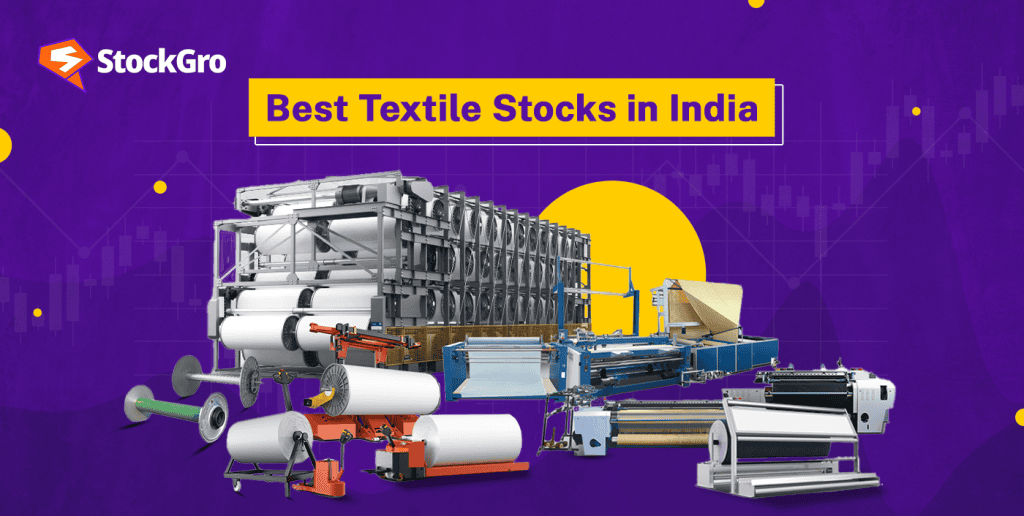
Employing around 45 million people directly and supporting countless others indirectly, the textile industry stands as one of India’s largest sources of employment. Textile and apparel exports contribute significantly to India’s foreign exchange earnings, accounting for approximately 12% of total exports.
Textiles play a vital role in driving India’s economy. This sector contributes approximately 2.3% to the national GDP. The international demand for Indian Textiles is growing, and the outlook for this sector is excellent. Given below are a few of the best stocks in textile sector to look out for in 2024:
You may also like: Textile industry in India – The foundation of fashionable clothing trends
Top textile company stocks in India based on market cap
| Company name | Market cap ( ₹ Cr.) |
| Arvind Ltd. | 9,836 |
| Trident Ltd. | 17,005 |
| KPR Mill Ltd. | 31,913 |
| Vardhman Textiles Ltd. | 13,918 |
Company performance and outlook
1. Arvind Ltd.
Arvind Ltd is quality in the Indian textile space, having good denim businesses and branded apparel businesses. The company boasts impressive portfolios in the domestic and international markets. Continuous attempt is on at premiumisation and value-added products for Arvind Ltd with a good financial track record.
Arvind Ltd. has experienced substantial growth, with a 14% increase in revenue due to strong volume growth across all businesses year-on-year in Q2FY25, however PAT–Profit After Tax– was impacted due to increased deferred tax provision as per The Finance (No. 2) Act, 2024.
2. Trident Ltd.
Trident has a strong presence in textiles and writing & printing paper (WPP), with textile revenue in FY24 well-diversified across yarn (26%), bed linen (19%), and bath linen (38%). The company has acquired significant market leadership both in the home market as well as in the overseas market.
It was experiencing increasing demand for the products in the export markets. At the same time, the company was expanding its capacities and diversifying the product portfolio for future growth.
4. KPR Mill Ltd.
KPR spans the entire textile value chain—from spinning cotton yarn to crafting finished garments—enabling flexibility. Financially, it’s well-diversified. In FY24, garments dominated, accounting for 42%, an increase from 40% in FY23. Close behind, yarn and fabric made up 32%, while the sugar, ethanol, and power divisions filled out the rest, adding stability to its earnings.
Sales have been steadily and progressively increasing in the products, in general, but more so on export markets. It has also invested in new technologies and expanded production capacities for better demand handling.
5. Vardhman Textiles Ltd.
Vardhman Textiles Ltd is the leading manufacturer for cotton yarn as well as blended yarn. Moreover, it had a huge market share in the domestic market as well as the export market. Planned investment of ₹2,500 crore, allocated over two years. Priorities include scaling spinning operations and enhancing fabric production
Vardhman Textiles Ltd has been on the advancing platform due to the increased demand for its product in the export markets. The company is also adopting new technologies and strengthening its production capacities to handle the increasing demands.
Also read: The Indian fashion industry: A booming sector with huge potential
Checklist to invest in textile stocks in India
Before you begin investing in the best textile stocks in India, here are a few important factors that come to your mind:
Raw material costs
Keep a track on the raw material cost and availability of cotton, silk, as well as synthetic fibres. Fluctuations in prices related to these materials can directly affect the profit margins and inventory levels of a textile company.
Industry and market trends
It serves to determine the general market and current trends in the textile sector. The demand for textiles, which includes domestic and global demand, along with evolving consumer preferences, are considered.
Quality of management
Assesses the company’s management team, their experience, and strategic approach. Well-led companies perform significantly better than others in facing the industry’s events and sustaining growth.
Financial strength
Analyse the company’s financial health through measures such as revenue growth, profit margins, debt, and return on equity. Healthy companies tend to enjoy bright, long-run prospects. This way, you can find the best textile stocks.
Competitive landscape
Analyse the intensity of competition in the industry and measure the company’s market share and competitive advantages. Companies with a strong market position often have bigger opportunities to gain.
Export market outlook
Of course, worldwide demand for textiles is one area that could heavily rely on export levels and potentially have a significant impact on top-line revenues.
Export demand variation is likely to influence share price in this category.
Also read: India’s cosmetic industry analysis
Is investing in textile stocks right for you?
The investment in textile stock can be rewarding, but it has some drawbacks. Profitability is affected by the changes in demand, while competition from the likes of China and Bangladesh with presumed low-cost textile production has it cutthroat.
The textile industry is very sensitive to government policies, hence affecting both the cost of production and the export markets. Ensure proper research on these factors for the right decisions regarding investments in the best stock in textile sector.
Conclusion
Indian textiles are a vast industry with immense potential for growth. Some of the stocks that best fit this description have been mentioned above as they have shown the highest prospects and performed better in relation to the industry’s growth.
However, conducting in-depth research is essential before committing to any investment. Seeking guidance from a qualified financial advisor can also provide valuable insights and help mitigate risks.
FAQs
What makes the Indian textile industry attractive for investors?
The Indian textile industry is one of the largest in the world, employing millions and contributing significantly to India’s economy. Its diverse product range includes cotton, silk, synthetic fibres, and ready-made garments, which are in high demand globally. Rising export revenues, favourable government policies, and growing consumer interest in sustainable and innovative textiles make it an attractive sector for investors looking for long-term growth potential.
Which factors should I consider before investing in textile stocks?
Before investing, it’s essential to review factors such as raw material costs, industry trends, and export market conditions. Investors should also examine a company’s financial health, focusing on revenue growth, profit margins, and debt levels. Additionally, assessing the management quality and competitive positioning within the industry can provide insight into the company’s stability and growth potential, helping investors make informed decisions in this sector.
What are the risks involved in investing in textile stocks?
Textile stocks come with risks, including fluctuating raw material costs, demand variability, and competition from countries like China and Bangladesh. Changes in government policies, which can impact production and export potential, also pose a risk. Market trends, like shifting consumer preferences toward sustainable textiles, require companies to adapt quickly. Investors must research these factors thoroughly to understand the sector’s volatility and evaluate if it aligns with their risk tolerance.
How does government policy impact the Indian textile sector?
Government policies greatly influence the textile industry, impacting costs, subsidies, and export regulations. Initiatives like the “Make in India” campaign and incentives for sustainable practices aim to strengthen the sector. However, policy changes regarding tariffs, labour laws, or environmental regulations can impact profitability and operational efficiency. Staying updated on relevant policies is crucial for investors to gauge potential opportunities or challenges that might affect textile stocks.
Is now a good time to invest in Indian textile stocks?
With global demand rising and India’s focus on boosting domestic manufacturing, the textile sector has promising growth prospects. Companies adopting sustainable practices and expanding into new markets may see increased revenue. However, market conditions, including inflation and competition, can influence short-term performance. For long-term investors, researching top-performing textile companies and understanding market trends can help in deciding if now is an opportune time to invest.

